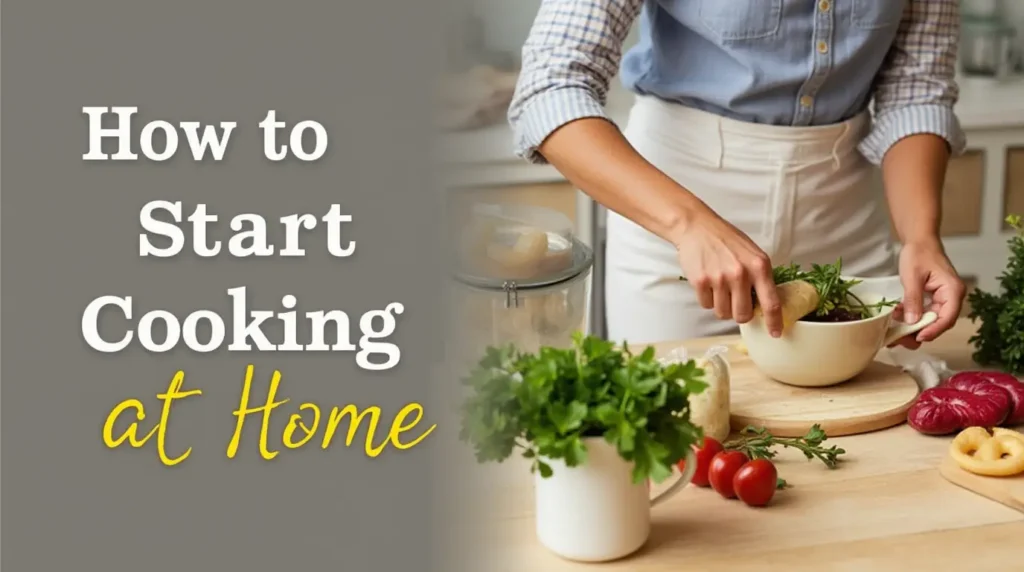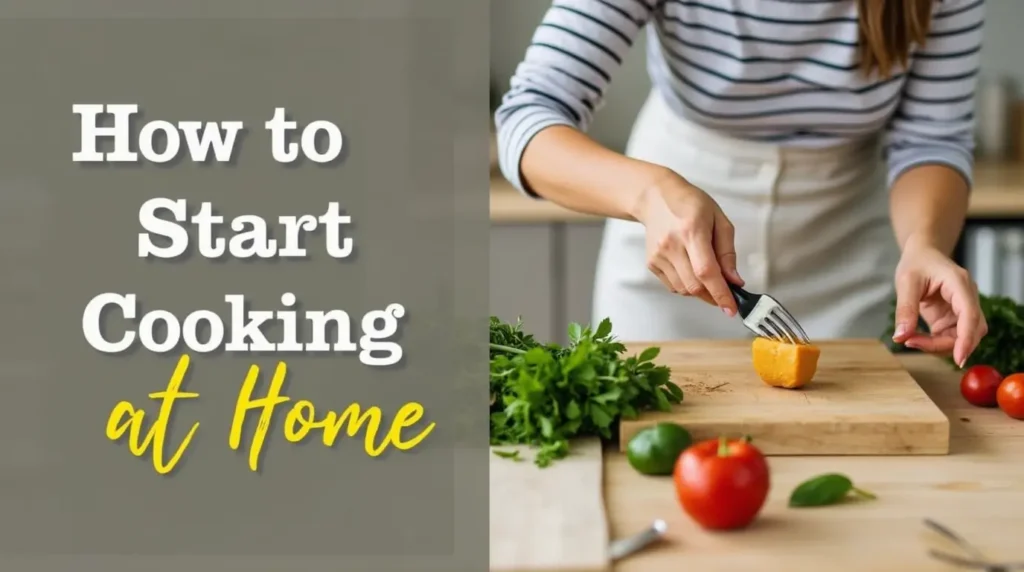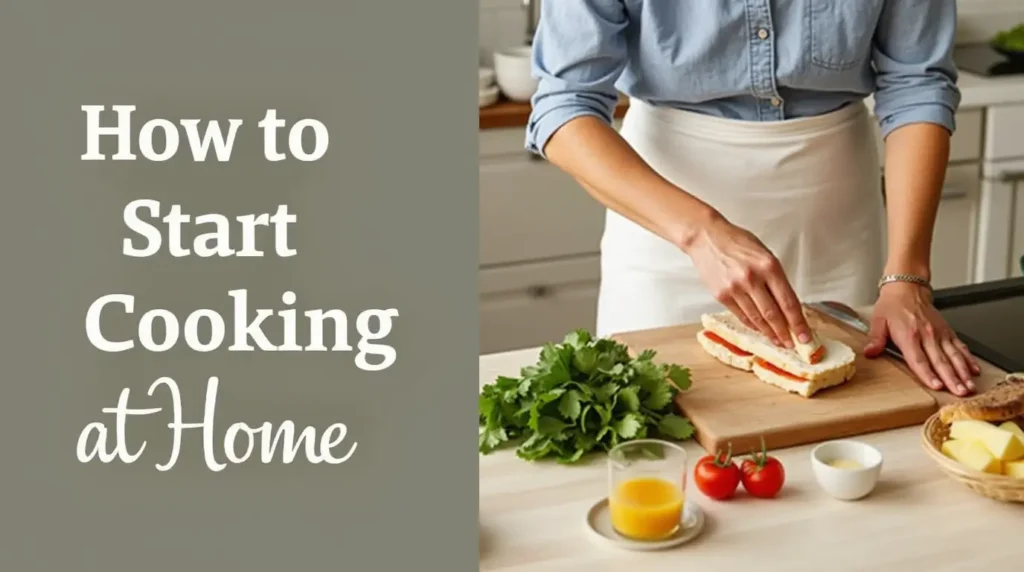HowToCook.news – Your Ultimate Guide to Delicious Cooking!
How to Start Cooking at Home – A Complete Guide for Beginners
Table of Contents
How to Start Cooking at Home – A Complete Guide for Beginners

I. How to Start Cooking at Home:
Ever felt overwhelmed by the idea of cooking at home? You’re not alone! Starting your culinary journey can be both challenging and incredibly exciting. Imagine the satisfaction of creating delicious meals from scratch. This guide is designed to take you from kitchen novice to confident home cook. We’ll cover everything from easy recipes for beginners and cooking terms for beginners to essential cooking tools for beginners, and more. Learning to cook at home offers numerous benefits, from saving money on takeout to enjoying healthier, personalized meals.
II. Learning the Basics: Cooking Terms for Beginners
- What Are Cooking Terms?
- Recipes often use specific terms that can be confusing if you’re new to cooking. These terms describe various techniques and processes.
- Why Understanding Cooking Terms is Crucial for Beginners
- Understanding these terms ensures you follow recipes accurately, preventing mistakes and leading to better results.
- Popular Cooking Terms Explained for Beginners
- Sauté: To cook food in a small amount of fat over medium-high heat.
- Roast: To cook food by prolonged exposure to heat in an oven or over a fire.
- Blanch: To briefly plunge food into boiling water and ice water to stop the cooking process.
- Broil: To cook food by exposing it to direct radiant heat.
- Julienne: To cut food into thin, matchstick-sized strips.
- And many more.
- Pro Tip: Use online cooking tutorials or apps to visually familiarize yourself with these terms.
III. Essential Cooking Tools for Beginners
- The Must-Have Kitchen Tools for Beginners
- Chef’s knife, cutting board, non-stick pan, saucepan, spatula, measuring cups and spoons.
- Why These Tools Are Important
- The right tools make cooking easier, safer, and more efficient. A sharp knife, for example, makes chopping ingredients faster and safer.
- Budget-Friendly Recommendations
- Start with affordable, quality tools. You don’t need the most expensive set; look for durable and functional options.
- Pro Tip: Invest in a good chef’s knife and a reliable non-stick pan as your foundation.

IV. Easy Beginner Cooking Recipes
- Why Simple Recipes Are Best for Beginners
- Start with easy, quick, and forgiving recipes that don’t require advanced techniques. This builds confidence and minimizes frustration.
- Beginner-Friendly Recipes to Try
- Pasta with garlic and olive oil, chicken stir-fry, scrambled eggs with vegetables, simple salads, and basic rice dishes.
- Step-by-Step Guides for Each Recipe
- (See bonus section below)
- Pro Tip: Begin with one-pot meals or sheet-pan dishes to minimize cleanup.
V. Kitchen Safety for Beginners
- Why Safety Should Always Come First
- Kitchen safety is essential to prevent accidents and injuries.
- Essential Kitchen Safety Tips
- Use proper knife handling techniques, be cautious around heat sources, and wash hands and surfaces to prevent cross-contamination.
- How to Prevent Common Kitchen Accidents
- Avoid burns by using oven mitts and keeping flammable materials away from heat. Prevent cuts by using sharp knives and cutting away from yourself.
- Pro Tip: Always wear closed-toed shoes and avoid distractions when cooking with heat.

VI. Cooking Tips for Beginners
- Tips to Make Cooking Easier and More Enjoyable
- Organize your kitchen, prep ingredients before cooking (mise en place), and understand cooking times.
- Time Management in the Kitchen
- Read the recipe thoroughly before starting, multitask when possible, and use timers.
- How to Avoid Common Mistakes
- Avoid undercooking by using a food thermometer and overcooking by monitoring cooking times. Always taste and adjust seasoning as you go.
- Pro Tip: Taste your food as you cook and adjust seasoning along the way.
VII. The Importance of Learning How to Start Cooking at Home
- Benefits of Cooking at Home
- Healthier meals with control over ingredients, significant cost savings compared to eating out, and the satisfaction of creating your dishes.
- Building Confidence in the Kitchen
- Starting with basic dishes and gradually advancing builds confidence and improves your cooking skills.
- Pro Tip: Create a weekly cooking schedule to stay consistent and track your progress.
VIII. Keep it Simple and Have Fun:
Cooking at home is a rewarding journey. Take your time, be patient, and enjoy the process. Mistakes are part of learning, so don’t be discouraged. Share your cooking experiences and favorite beginner recipes in the comments below!
IX. Bonus: A Few Easy Recipes for Beginners
- Quick Pasta with Garlic and Olive Oil
- Ingredients: Pasta, garlic, olive oil, red pepper flakes, salt, pepper.
- Instructions: Cook pasta according to package directions. Sauté garlic in olive oil, add red pepper flakes. Toss with pasta, season, and serve.
- One-Pan Chicken Stir-Fry
- Ingredients: Chicken breast, vegetables (broccoli, peppers, onions), soy sauce, ginger, garlic.
- Instructions: Cut chicken and vegetables. Cook chicken in a pan, add vegetables, and stir-fry. Add soy sauce, ginger, and garlic, and cook until vegetables are tender.
- Scrambled Eggs with Vegetables
- Ingredients: Eggs, vegetables (spinach, tomatoes, mushrooms), salt, pepper.
- Instructions: Whisk eggs, chop vegetables. Sauté vegetables, add eggs, and scramble until cooked. Season and serve.
How to Cook: Easy Recipes and Tips




